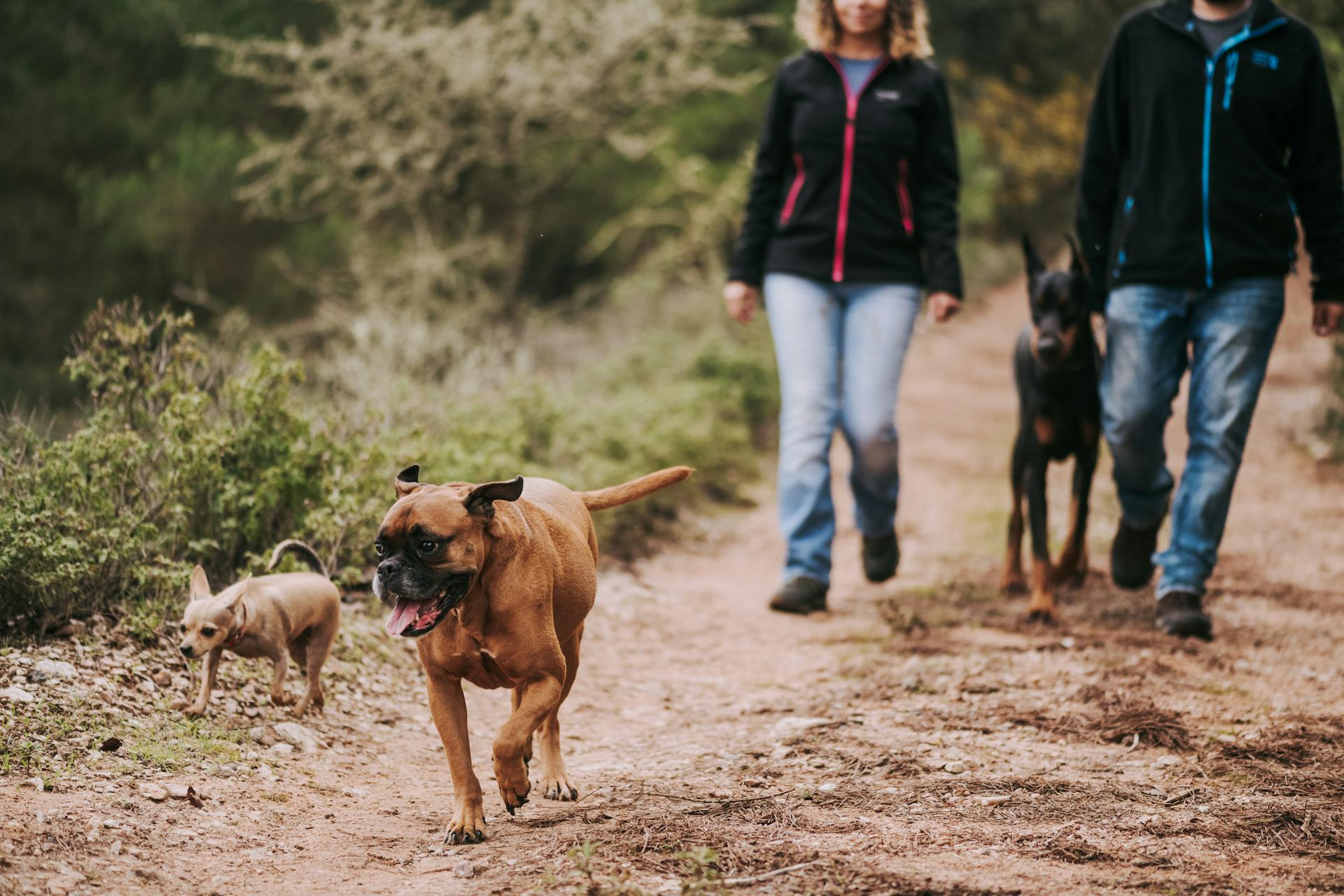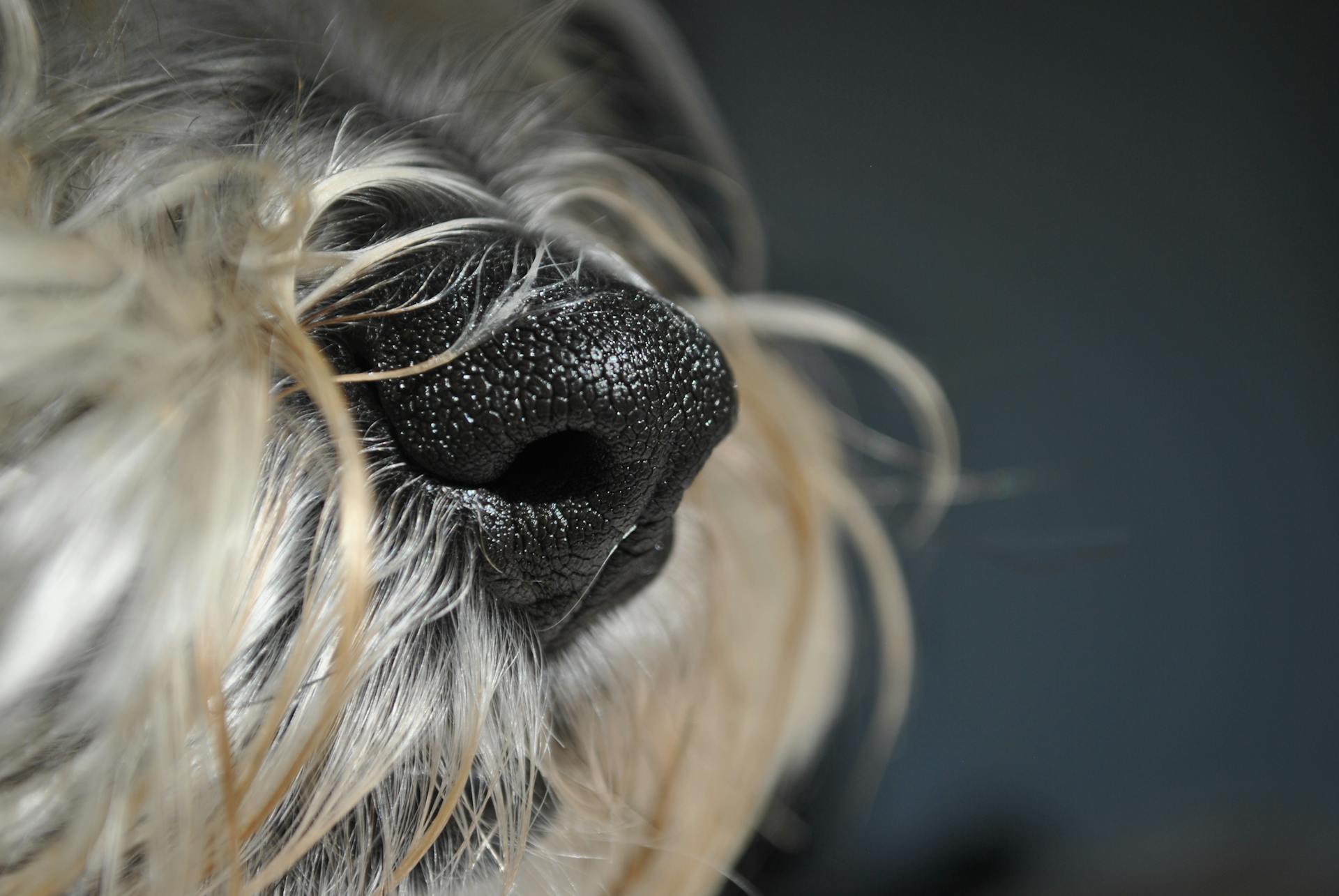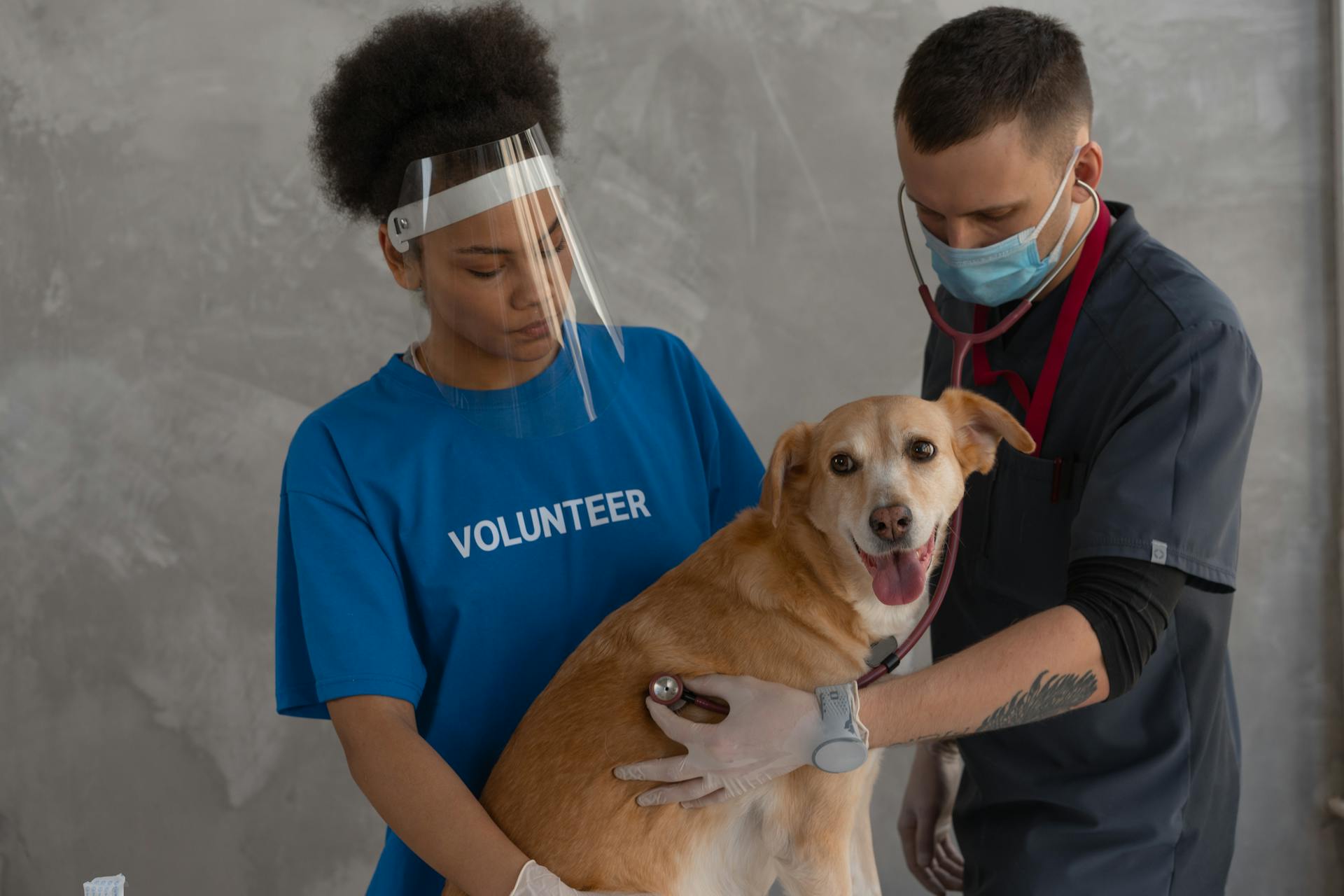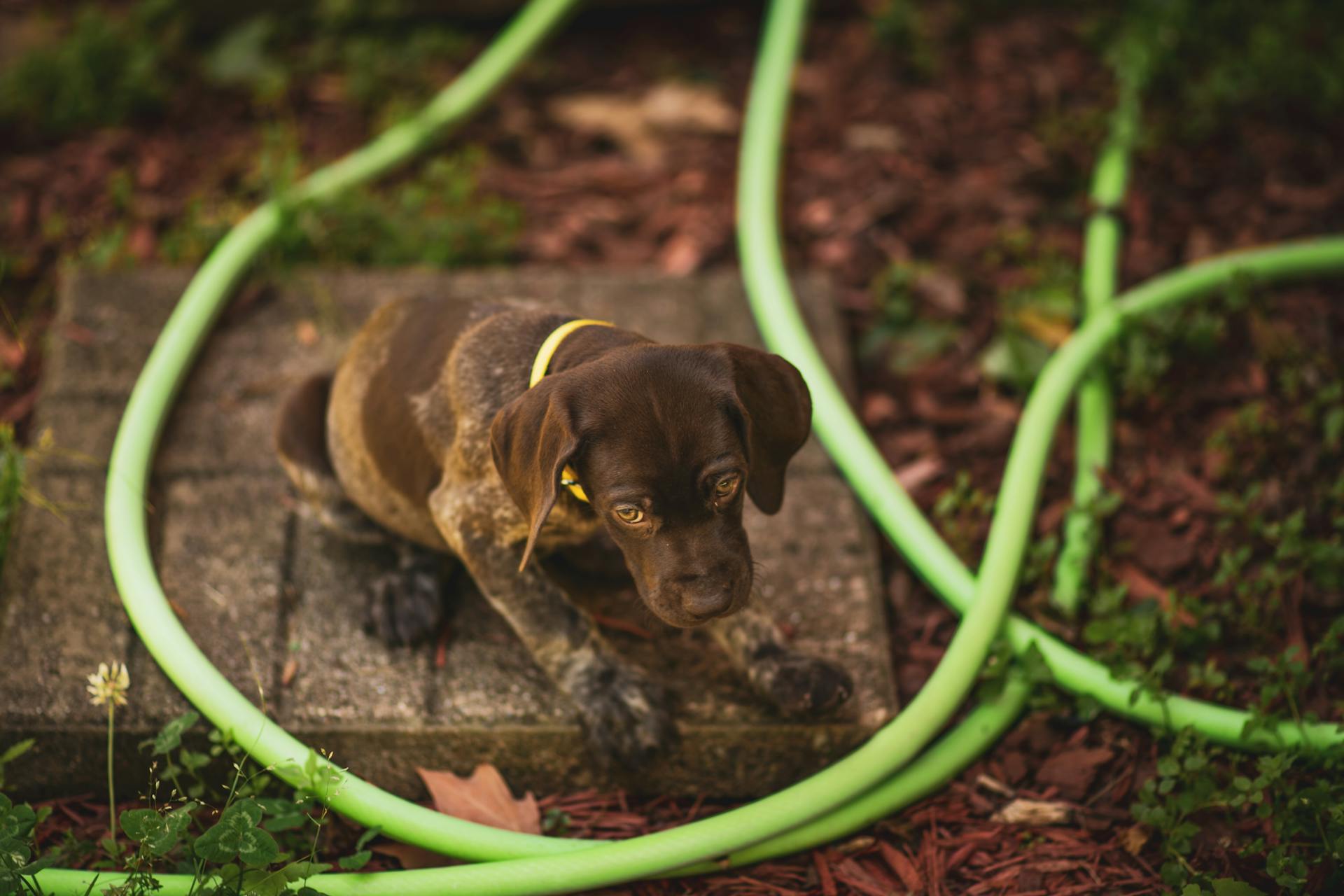
Kennel cough, also known as tracheobronchitis, is a highly contagious respiratory infection in dogs.
The infection is usually caused by the Bordetella bronchiseptica bacteria, but it can also be caused by other viruses and bacteria.
Symptoms of kennel cough can include a persistent cough, runny nose, and sneezing.
In severe cases, the cough can be so severe that it causes the dog to gag or vomit.
Dogs with kennel cough often display a characteristic "goose-honk" cough, which is a loud, hacking cough that can be quite alarming to hear.
This type of cough is usually accompanied by a lack of energy and a reluctance to exercise or play.
In most cases, kennel cough is not a serious condition and can be treated with antibiotics and rest.
However, in some cases, kennel cough can lead to more severe complications, such as pneumonia or bronchitis.
Worth a look: Dog Upper Respiratory Infection vs Kennel Cough
What Is It?
Kennel cough, also known as infectious tracheobronchitis, is a contagious respiratory disease that affects dogs. It's caused by a virus or bacteria, typically Bordetella bronchiseptica.
The symptoms of kennel cough are similar to those of a throat infection in humans, including a persistent cough, runny nose, and sneezing. A dog may also exhibit a lack of appetite and lethargy.
The cough associated with kennel cough is usually dry and hacking, and can be triggered by exercise or excitement. It's often described as sounding like a honking goose.
Symptoms and Diagnosis
A persistent, forceful cough is the classic symptom of kennel cough, often sounding like a goose honk. It's distinct from a reverse sneeze, which can be normal in certain dogs and breeds.
A runny nose, sneezing, or eye discharge may accompany the cough, and some dogs may even seem unusually tired or have a mild fever. These secondary symptoms can provide critical clues for an accurate diagnosis.
If you notice any of these symptoms in your dog, it's essential to have them seen by a veterinarian right away, as kennel cough can progress to pneumonia.
Explore further: Kennel Cough Treatment for Dogs
Causes of

Kennel cough in dogs can be caused by multiple bacteria and viruses, including Bordetella bronchiseptica bacteria, Canine adenovirus, and Parainfluenza virus.
The viruses and bacteria that cause kennel cough can be spread through respiratory secretions like coughing and sneezing, as well as through contact with infected objects.
Dogs can contract kennel cough from other dogs in crowded areas, such as animal shelters, boarding kennels, dog daycare facilities, grooming facilities, and dog parks.
The common culprits behind kennel cough are:
- Bordetella bronchiseptica bacteria
- Canine adenovirus
- Parainfluenza virus
- Mycoplasma
- Canine influenza virus
- Canine distemper virus
- Canine respiratory corona virus
- Canine reovirus
Symptoms of
Symptoms of kennel cough can be subtle, but they're essential to recognize. The classic symptom is a persistent, forceful cough that sounds like a goose honk. This is distinct from a reverse sneeze, which is a normal occurrence in some dogs and breeds.
Other symptoms may include sneezing, a runny nose, or eye discharge. Some dogs may also exhibit lethargy, loss of appetite, or a mild fever. It's crucial to note that these symptoms can progress to pneumonia, so if you see any of these more severe signs, you should have your pet seen right away.

Here are some common symptoms of kennel cough:
- Dry, hacking cough: This is the most noticeable sign, often sounding like your dog has something stuck in their throat.
- Runny nose: A nasal discharge may accompany the cough.
- Sneezing: Some dogs with kennel cough also exhibit sneezing.
- Lethargy: Your normally active dog might seem unusually tired.
- Loss of appetite: Watch for any changes in eating habits.
- Low fever: Though less common, some dogs may have a mild fever.
- Retching or gagging: This can sometimes occur after intense coughing spells.
- Watery eyes: Like the runny nose, this can be a sign of upper respiratory infection.
- Changes in breathing: If your dog's breathing becomes rapid or labored, it's a cause for concern.
- Change in bark: Your dog's bark may become hoarser.
Treatment and Recovery
Kennel cough can be a miserable condition for dogs, but with the right care, they can recover quickly. Treatment for kennel cough often includes antibiotics to combat the bacterial causes of the disease, primarily Bordetella bronchiseptica.
Supportive care is an essential part of managing kennel cough. This means providing a calm and stress-free environment for your pet to speed up recovery. You should also ensure they're well-hydrated and nourished, and limit physical activity to prevent triggering coughing fits.
In some cases, a cough suppressant may be prescribed to help reduce the frequency of the cough. You can also help keep your dog's airways moist by keeping them in the bathroom while you shower or adding a humidifier to their sleep area.
Here are some tips to help your dog recover from kennel cough:
Recovery and Management
If your dog has kennel cough, it's essential to keep them away from other animals to prevent the spread of the disease.

Kennel cough is contagious, so keep your dog isolated until they're no longer showing symptoms.
To speed up recovery, provide a calm and stress-free environment for your pet. This can be achieved by minimizing exposure to irritants such as household cleaners, cigarette smoke, and dust.
A humid environment can help soothe your dog's dry airways, so consider keeping them in the bathroom while you shower or using a humidifier in their sleeping area.
To reduce coughing fits, limit physical activity and avoid using a collar and leash. Instead, switch to a harness during walks, as collars can put extra pressure on the trachea.
If your dog is experiencing severe kennel cough, hospitalization may be necessary, along with intravenous fluids, antibiotics, and possibly oxygen therapy.
Here are some tips to help manage your dog's recovery:
- Keep your dog hydrated by providing plenty of water
- Nourish them with a balanced diet
- Limit physical activity to prevent triggering coughing fits
- Use a humidifier to keep their airways moist
Vaccine
The kennel cough vaccine is a valuable tool in preventing and treating this common illness in dogs. It's not 100% effective, but it can significantly reduce the severity of symptoms.

Dogs with brachycephalic faces, such as English Bulldogs and Pugs, are strongly encouraged to get the vaccine due to their compromised airways. This breed group struggles with recovering from respiratory diseases.
The vaccine comes in various forms, including an oral liquid that's very safe with minimal side effects. No needle is required, making it a convenient option for pet owners.
Dogs that never have exposure to other dogs may elect to skip vaccinating for kennel cough. However, the vaccine is still a good option in many cases.
Prevention and Hygiene
Maintaining good hygiene practices can help prevent the spread of kennel cough. Regularly disinfect common areas and items your dog comes in contact with to keep them clean.
Isolating your dog from other dogs if they have kennel cough is crucial to prevent transmission. The typical time for isolation is 2 weeks after the cough resolves.
Vaccination against kennel cough can help minimize the risk of your pet getting kennel cough. Vaccination against one of the common causes, Bordetella bronchiseptica, is generally recommended.
On a similar theme: Can Dogs Get Kennel Cough after Vaccination
Regularly cleaning your dog's living space, including any beds or kennels they may lounge in, can help prevent kennel cough. This includes disinfecting common areas and items your dog comes in contact with.
Asking about vaccine requirements when looking for grooming facilities, daycare facilities, or general doggy play date partners can help ensure the dogs your pup will be in contact with are also vaccinated.
When to See the Vet
If your dog's cough lasts more than a week, or worsens, make an appointment with their vet.
Their normal body temperature is 100 to 102.5 degrees F, so if they have a fever, it's a good idea to take them to the vet.
If they seem extra tired or won't eat, it's a sign that something is wrong and they need to see a vet.
Other health problems can also be a reason to visit the vet.
Here are some questions your vet may ask you:
- Does your dog have trouble breathing between coughing fits?
- When do they do it? (At night? After eating? After drinking water? After exercise? When they are excited?)
- What does it sound like? (A goose? A seal?)
- Is the cough dry or moist?
- Does it sound like they are about to vomit?
- Where has your dog been lately? (In a place with other dogs? With you on a family vacation? Around a smoker?)
- Have there been any changes to their daily routine?
- Are they up-to-date on their vaccines and heartworm prevention?
- When did they last take their medication?
Navigating the Condition
The best way to navigate kennel cough is by reading on to learn more about it.
Kennel cough is a contagious respiratory infection that can be caused by a virus or bacteria.
Symptoms can take up to 14 days to develop after exposure to the virus or bacteria.
Treatment options for kennel cough include antibiotics, cough suppressants, and rest.
Antibiotics are only prescribed if the kennel cough is caused by a bacterial infection.
Cough suppressants can provide relief from the persistent cough associated with kennel cough.
Rest is essential to help the body recover from the infection.
Home remedies such as humidifiers and saline drops can also help alleviate symptoms.
Humidifiers can help loosen and clear mucus from the throat.
Saline drops can help soothe the throat and reduce coughing.
In severe cases, hospitalization may be necessary to provide supportive care.
For more insights, see: Antibiotic for Kennel Cough
Frequently Asked Questions
What mimics kennel cough?
Other conditions that can cause coughing in dogs include canine distemper virus, canine influenza virus, collapsing trachea, bronchitis, asthma, and heart disease, all of which can mimic kennel cough symptoms. If your dog is coughing, it's essential to consult a veterinarian to determine the underlying cause.
Sources
- https://veterinaryemergencygroup.com/blog/kennel-cough-in-dogs/
- https://www.webmd.com/pets/dogs/kennel-cough-in-dogs
- https://www.petmd.com/dog/conditions/respiratory/kennel-cough-dogs-symptoms-and-treatments
- https://www.guilfordjamestownvet.com/site/blog-greensboro-vet/2024/02/15/dog-kennel-cough-symptoms
- https://mendocinoanimalhospital.net/blog/10-signs-of-kennel-cough-and-how-to-protect-your-dog/
Featured Images: pexels.com


